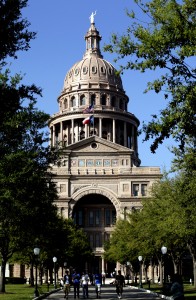Lawmakers Again Consider Overhauling How Pollution Permits Are Fought
It’s a familiar story. A factory, a power plant, or maybe a landfill wants to open in Texas. People who live nearby worry about pollution, and protest the project. Their challenge goes to the State Office of Administrative Hearings and, eventually, to the Texas Commission on Environmental Quality.
Business groups have wanted to overhaul that process for a long time. It’s come up during almost every recent legislative session. And tomorrow, it will come up again at an interim meeting of the House Environmental Regulation Committee. The committee has been charged with looking at the process of “contested case hearings” ahead of next year’s legislative session.
Here’s how contested case hearings work: to operate a business that pollutes in Texas, you need permits from the TCEQ. Contested cases happen when citizens or environmental groups challenge those permits. In some cases those challenges turn into hearings, not unlike court cases, with the companies and their opponents giving testimony and presenting evidence.
Business groups say the system is used as a blunt instrument to delay or block new development. But supporters say it’s the best check against improper permitting in a state as industry-friendly as Texas.
During last year’s legislative session a bill trying to overhaul the system – backed by business groups – failed. That bill would have limited the number of hearings and put the burden of proof on the person requesting the hearing to show that the permit should not be issued.
At a State Senate Committee hearing on the issue last year, business groups testified that contested cases were being used to squeeze concessions from companies, in some cases prompting them to locate out of state.
Environmental groups and citizens coalitions spoke in favor of contested cases.
When asked if he thought the current system scared some business from opening in Texas Cyrus Reed, Lone Star Sierra Club said at the time that “it may be advantageous to some industries to move to China cause they don’t have the same environmental regulations we do. But we don’t want the environmental regulations that China has.”
The House Environmental Regulation Committee will be looking at the issue as one of their interim charges to “study the economic impact that the state’s permitting processes have on Texas manufacturing sectors and how neighboring states’ and the federal permitting processes and timelines compare to those in Texas.” The meeting gets started at 10 a.m. Central, and you can watch online.


